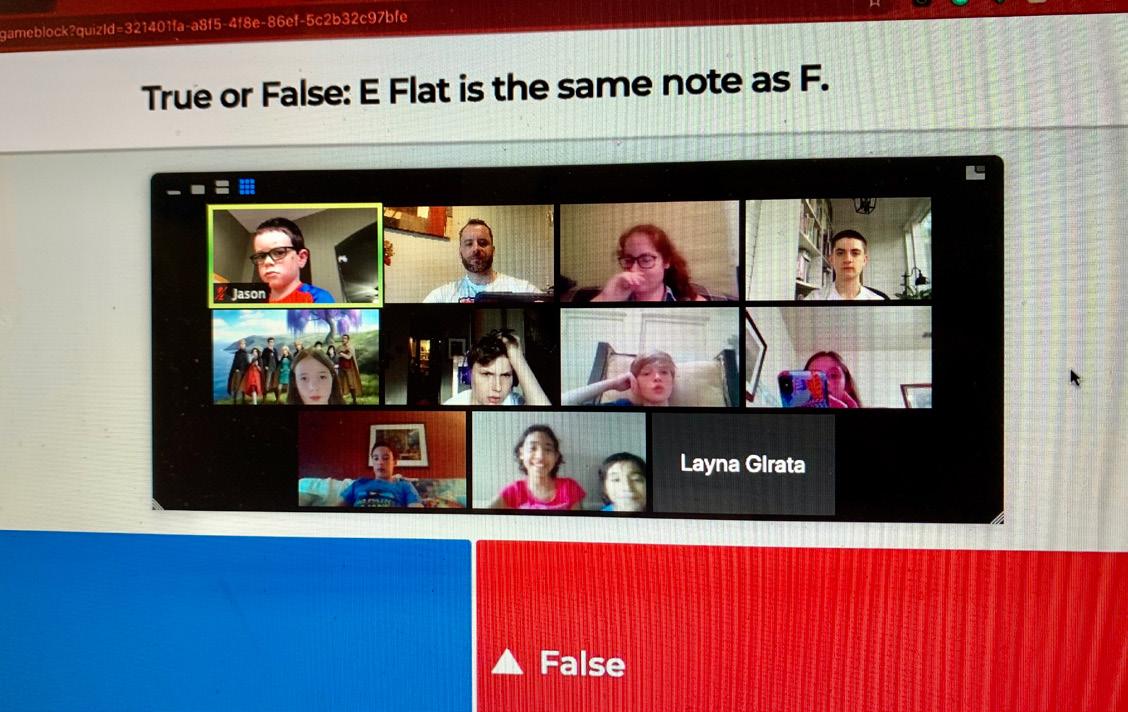
4 minute read
From The Loft
By Jonathan Ryan, Director of Music & Organist
What if I told you that our chorister program is first and foremost about discipleship? And only secondarily about singing or music? It’s true.
As our chorister program for young people begins its third year this fall, we have enough experience right here at Saint Michael to back this up. We’ve seen how our program brings its young people from a variety of areas and schools together to form deep and lasting friendships. We’ve witnessed how the program’s mentorship, which is foundational to what we do, has grown leaders, more deeply engaged the new and younger children, and opened eyes to see those beyond the normal, everyday radar of peers.
Some of our choristers have worked longer to achieve their status in the choir than anything else they’ve ever done, whether that’s earning their admission as full choristers by receiving the white surplice to wear or one of the colored ribbons indicating their accomplishment. Sometimes, the process has lasted 9 to 12 months or more. They have experienced just how much can be accomplished with a firm commitment, and learned how to not give up. Their training includes learning how to focus for considerable periods of time, giving 100% effort, and not allowing distractions to compromise their effort. Our rehearsal methods make every child count: no one slips through the cracks. That’s an experience of how every person matters. Choristers realize that unfocused or poor conduct affects many others besides them, and is one of many ways teamwork is absorbed and learned. The list can go on…
Oh yes, they also sing, too.
And the choristers are important leaders each week in the most highly attended Sunday service (at least outside of a pandemic!).
But, the thing that is so special and exceptional for a church choir of young people is the discipleship.
What I wrote above is the primary reason we chose the Royal School of Church Music (RSCM) training method and structure for our chorister program. It has not so much to do with singing or making music, but everything to do with everything else.

Zoom lessons and rehearsals are a normal part of life now.
All of these non-singing, non-musical things are why we are so excited about this still relatively new program. And why we’ve made sure we continue it during our pandemic time. In fact, for most of our choristers, it was the only activity they had this past spring outside of school. Many parents further shared that our weekly chorister Zoom social was a highlight of their child’s week!
The non-singing, non-musical things are also why we aren’t settling for our chorister program to end at 8th Grade (as many do around the country). This fall, we have our final expansion of our chorister program to go through high school. Again, it’s all about discipleship. Puberty isn’t easy for anyone. As our choristers experience so much change, we want their church’s presence in their lives to remain unchanged.
Their church’s presence includes friends, some of which are the closest friends they have, older role models, adults who believe in them and enable their achievement, appropriate pride in their accomplishments, the consistency of the weekly routine to which they’ve committed, a visible role of leadership within our entire parish, and, of course, a lot of fun along the way.
The experience of this constant in their lives as they grow up is a formational experience of how to live life: simply growing older or entering a new chapter of life doesn’t absolve us of discipleship. Importantly, our responsibility as a church in discipling is demonstrated: we won’t give our young people such a comprehensive formation and opportunity only to turn them away once they finish 8th grade.
Again, think of the journey these young people will have with their chorister life going through high school rather than just 8th grade: their experience of being discipled doesn’t end simply because of age or a new chapter in life. Being discipled and discipling others is a constant throughout our lives. And it’s a constant in their chorister journey to adulthood.
I’m deeply grateful for the leadership and stewardship of Saint Michael for answering this call to discipling our young people by supporting our chorister program in its expansion to high school. We see this perhaps most visibly now in the transition of our part-time Organ Scholar position to a full-time Assistant Director of Music position. Happily, it coincided with our former Organ Scholar Owen Reid’s time with us concluding anyway from his graduation from SMU. Churches that carry such RSCM-based chorister programs through high school consistently find that their high school choristers are among the most committed, engaged people in any volunteer ministry.
As we enter a season of parish-wide discipleship this fall, I ask you to spread the word about our chorister program. For us to reach as many young people as we want, we need to have an expansive reputation throughout our region. Nothing helps that more than word of mouth. And to anyone with children from age 4 through high school, please tell them they need to try this extraordinary opportunity!
To all parents: this is your clarion call to have your child try choristers! It’s so much more than just singing or music. We begin at age 4. No experience, background, or training in music is needed – we take care of all that. What we need is a willingness to try. Even in our pandemic time with its uncertain future, our chorister program continues. Visit saintmichael.org/choristers, or contact Julia Beckel, Music Administrator at jbeckel@saintmichael.org for more information. We want to hear from you and transform the life of young people!

The Kahoot game was part of those weekly Zoom socials, and they were Chorister-led by the more advanced Choristers.










